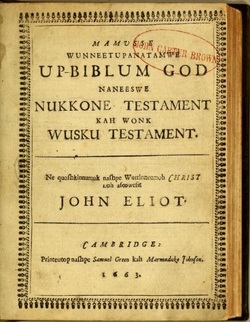
Eliot was born in England, educated at Cambridge University, and emigrated to America. Arriving in Massachusetts in 1631, Eliot began missionary work with the Massachusett Indians, learned their language and served them for many years.
As early as 1649 Eliot wrote, “I do very much desire to translate some parts of the Scriptures into their language… and teach them to read … Such a thing will be troublesome and chargeable, and I have not means of my own for it.”
But Eliot persevered. He began the work of translating the Bible into Algonquin, but was beset by many delays and difficulties. In 1653 the work was still not done, and he wrote:
“I have had a great longing desire (if it be the will of God) that our Indian language might be sanctified by the translation of the holy Scriptures into it … but I fear it will not be obtained in my dayes. I cannot stick to the work, because of my necessary attendance to my ministrie in Roxbury, and among the Indians at sundry places …”
For years Eliot persisted despite his many other responsibilities. In his translation work there was often no Algonquin equivalent of a word, so in many cases he had to substitute an English word from the Geneva Bible or King James version. But Eliot did not translate simply from the English; he had studied Hebrew and Greek and often used the original texts as the basis for his translation.
Eventually Eliot’s persistent struggle paid off. In 1658 he wrote: “The whole book of God is translated into their own language; it wanteth but revising, transcribing, and printing. Oh, that the Lord would so move, that by some means or other it may be printed.” That prayer was to be answered. A British missionary society called the Corporation for the Propagation of the Gospel sent a printing press and special fonts to represent the sounds of Algonquin, and even a printer on a three-year term to conduct the printing. Later, another workman was sent from England to bind the copies.
Finally, in 1663, after years of patient striving, Eliot saw his dream fulfilled – the printing of the complete Bible in the Algonquin language: Mamusse Wunneetupanatamwe Up Biblum God. The front cover page of the Bible translates as: “The Whole Holy His-Bible God, both Old Testament and also New Testament. This turned by the-servant-of-Christ, who is called John Eliot.”
For his work with the Massachusett Indians and his translation and printed Bible, Eliot is often called “The Apostle to the Indians.” It is a well-deserved title and one fitting for an individual who strove for over thirty years to bring Up Biblum God to its people.
 RSS Feed
RSS Feed
